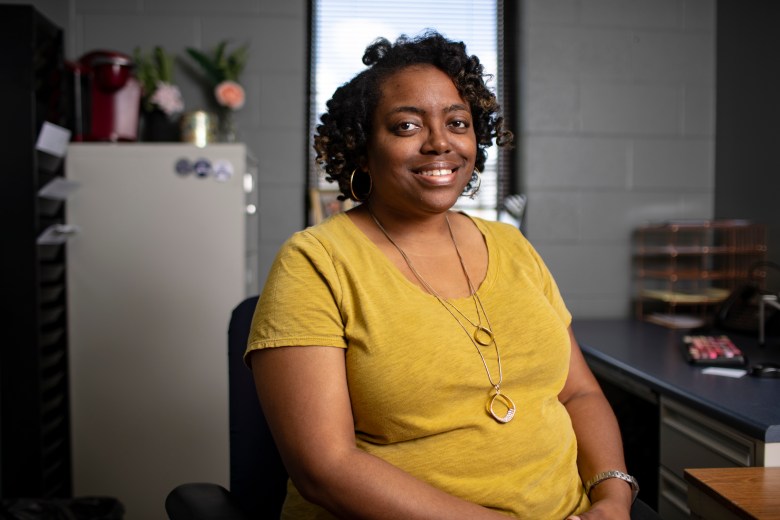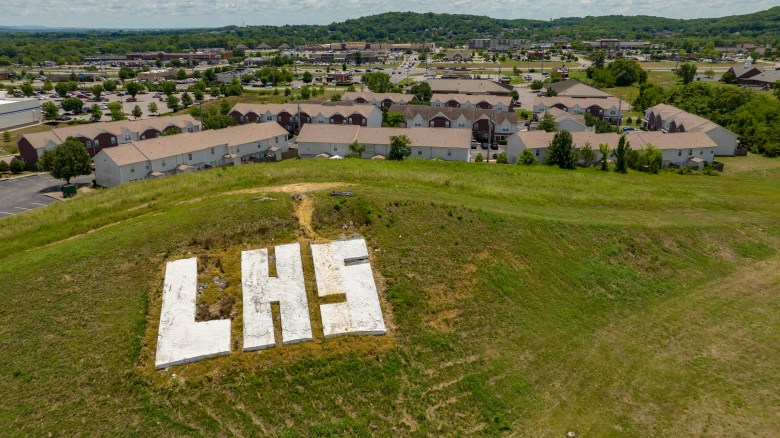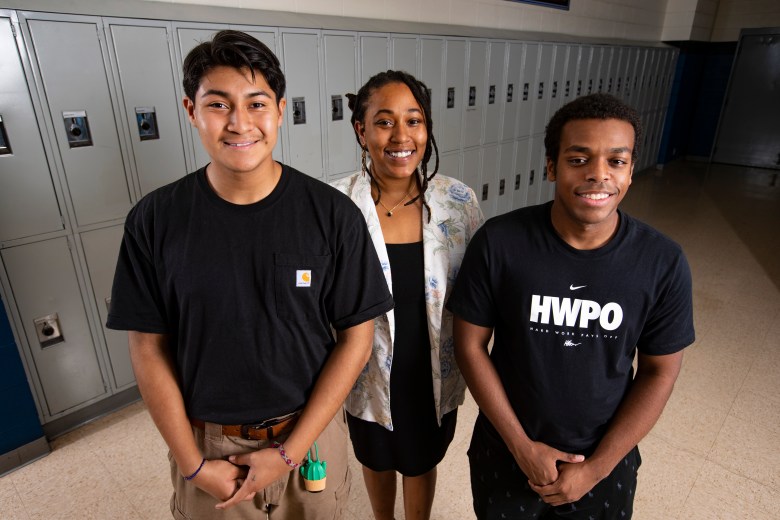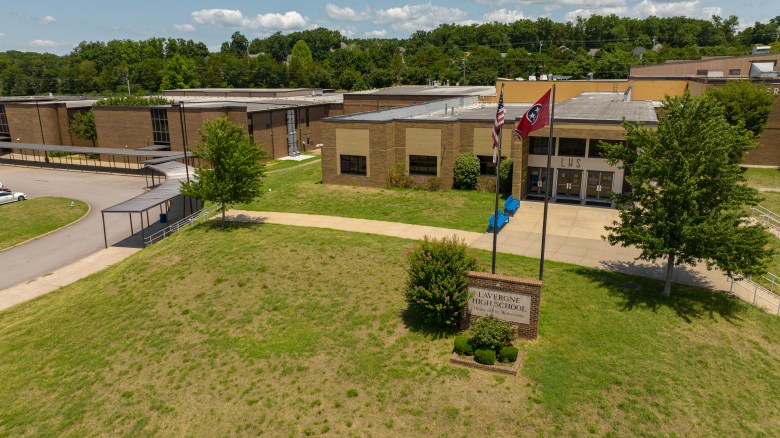LA VERGNE, Tenn. — As the football and girls’ soccer teams sweated through summer practice on the athletics fields at LaVergne High School, a small group of adult advisers inside shared tales of their own ordeals.

They spoke of high school graduates who had balked at writing essays or filling out the forms required to apply to college. Of parents suspicious about divulging what they earn so that their kids could get financial aid. Of students sure there was easy money to be made on TikTok or YouTube, or in jobs at the Volkswagen plant in Chattanooga.
Part of a cadre of advisers deployed by the state to prod more Tennessee high school graduates into college, the women in this conference room have suddenly found their jobs to be much harder.
The proportion of high school graduates in Tennessee who are going directly to college is plummeting. Last year, it was less than 53 percent. That’s down 11 percentage points since 2017.
“He starts telling me, ‘I don’t want to do this,’ ” one adviser, Portia Cook, was recounting to her colleagues from the state program, called Advise TN, about a student at the top of his class who had changed his mind about continuing his education. “ ‘You’re talking about four more years of school? No.’ ”

Similar conversations took place nationwide this summer as worried state officials grappled with a dramatic and continuing slide in the number of Americans willing to invest the money and the time it takes to go to college. It’s a trend that experts say is likely to diminish people’s quality of life and the country’s economic competitiveness.
College skepticism, by the numbers
Proportion of Americans who say college is worth the cost:
32 percent
Proportion who said that before the pandemic:
50 percent
Proportion of 14- to 18-year-olds who think education is necessary beyond high school:
45 percent
Proportion who thought so before the pandemic:
60 percent
Proportion of adults who have a “great deal” or “quite a lot” of confidence in higher education:
48 percent
Proportion who had confidence in higher education in 2015:
57 percent
Proportion of adults who think more education will help advance their career or get a stable job:
39 percent
Proportion who thought so before the pandemic:
48 percent
Proportion of teenagers planning on college who say it makes sense for education to take two years or less:
47 percent
Proportion who are open to something other than a four-year degree:
more than half
Sources: Strada Education Network, ECMC Group, Gallup
“With the exception of wartime, the United States has never been through a period of declining educational attainment like this,” said Michael Hicks, director of the Center for Business and Economic Research at Ball State University’s Miller College of Business.
There has been a significant and steady drop nationwide in the proportion of high school graduates enrolling in college in the fall after they finish high school — from a high of 70 percent in 2016 to 63 percent in 2020, the most recent year for which the figure is available, according to the National Center for Education Statistics.
The proportion of high school graduates enrolling in college in the fall after they finish high school has dropped from a high of 70 percent in 2016 to 63 percent in 2020.
Many observers have suggested three principal explanations for the falloff: the Covid-19 pandemic, a dip in the number of Americans under 18 and a strong labor market sucking young people straight into the workforce.
But while the pandemic made things worse, the enrollment downturn took hold well before it started; there were already two and a half million fewer students at colleges and universities by the time that Covid set in than there were in 2012. Another million and a half have disappeared since then.
Demographics alone cannot explain the scale of this drop. And statistics belie the claim that recent high school graduates are getting jobs instead of going to college; workforce participation for 16- to 24-year-olds is actually lower than it was before Covid hit, the Bureau of Labor Statistics, or BLS, reports.
Related: Beyond the Rankings: The College Welcome Guide
Myriad focus groups and public opinion surveys point to other reasons for the dramatic downward trend. These include widespread and fast-growing skepticism about the value of a degree, impatience with the time it takes to get one and costs that have finally exceeded many people’s ability or willingness to pay.
“The expectations of going to college from their parents, it died down — that if you don’t go to college, you’re a bum,” Ever Balladares said about why many of his fellow graduates of LaVergne High, southeast of Nashville, don’t plan to continue their educations, as he does. “They don’t think that anymore.”

Tennessee is not the only place experiencing this trend. While not all states measure college-going in the same way or have data for the same years, some have also seen declines much higher than the national average.
The proportion of high school graduates going to college in Indiana dropped to 53 percent in 2020, down by 12 percentage points from five years earlier — a pace Commissioner for Higher Education Chris Lowery has called “alarming.” In West Virginia, 46 percent of 2021 high school graduates went on to college the following fall, 10 percentage points below that state’s high of 56 percent in 2010.
Fifty-four percent of 2021 high school grads in Michigan went straight to college, down 11 percentage points from 2016. In Arizona, 46 percent of high school graduates in 2020 went to college the following fall, a drop from more than 55 percent in 2017. In Alabama, recent high school graduates’ college-going in 2020 fell to 54 percent, down 11 percentage points since 2014; and in Idaho, to 39 percent, down 11 percentage points since 2017.
Related: A new way to help college students transfer: Admit them to two schools at once
Americans are increasingly dubious about the need to go to college. Fewer than one in three adults now say a degree is worth the cost, according to a survey by the Strada Education Network.
“That conversation has come up more frequently — ‘Is it worth it?’ ” said Jennifer Kline, a counselor at Festus High School in Festus, Missouri, a state where the proportion of high school graduates going straight to college is down by 6 percentage points since 2017, to 61 percent. “I just have more and more parents who are saying, ‘Nope. You’re not going to do that. You’re not going to a four-year college.’ ”

Her students’ parents “just don’t value education the way they did in the past,” said Amanda DeBord, an Advise TN adviser in a rural part of Tennessee. “I feel like that’s been slipping for a few years.”
On top of all that is growing dissatisfaction among recent university and college graduates with the value of the education they received.
More than four in 10 bachelor’s degree holders under 45 did not agree that the benefits of their educations exceeded the costs, according to a survey by the Federal Reserve. Only a quarter of recent grads in another survey, by the educational publishing and technology company Cengage, said that, if they could do it again, they’d take the same educational path.
That adds up to a lot of bad reviews passed down to younger siblings and classmates, who consider family and friends the most trustworthy sources about whether and where to go to college, according to a survey by Vox Global, for the Indiana Commission for Higher Education, that also combed through social media.
“If you don’t believe your degree was worth the cost and you tell everybody that, that has a huge impact,” said Stephanie Marken, a partner at the Gallup polling organization in its education division.
Meanwhile, months of discussion about whether the Biden administration will forgive all or some student loan debt has had an unintended consequence: It has reminded prospective learners just how much people before them had to borrow to pay for college. So has the fact that many of their parents are still paying back their student loans.

“The conversation about student debt they’re hearing constantly is playing into their perception,” said Samantha Gutter, chief access and outreach officer at the Tennessee Higher Education Commission, which surveyed high school seniors about their college-going plans.
“These numbers have been around for quite some time,” said Kim Cook, chief executive officer of the National College Attainment Network. “But right now, it’s just a world where this is more headline news.”
Other headlines include the ones about resurgent scams and scandals that have forced taxpayers to assume the debt of students whose colleges and universities misled them. The U.S. Department of Education in June discharged $5.8 billion worth of federal loans borrowed by students of the defunct for-profit Corinthian Colleges, for example. Cases such as that have “really put a sour taste in the mouths of some people,” Hicks said.
Related: A handful of colleges are finally providing training in a way consumers want it: fast
Between 2015 and 2019, Americans’ faith in higher education dropped more than their confidence in any other institution measured by the Gallup polling organization — an extraordinary erosion of trust, considering that list includes the presidency, Congress, big business and the criminal justice system.
“There’s anti-elitism, anti-institutionalism, a perception that cost is out of control,” said Marken. “We’re also having a hangover from a lot of bad actors in higher ed who misrepresented their product.”
These problems, now coming home to roost, were evident for years, but colleges and universities in general have done little to address them.

They stick to a policy of advertising prices few consumers pay but that discourage many from applying. They bury students in red tape that is especially confounding for the increasing number of would-be applicants whose parents never went to college. And they often fail to make clear connections between academic disciplines and careers or keep up with the demands of the fast-moving labor market.
“We have not focused enough on outcomes,” said Ruth Watkins, former president of the University of Utah and now president of Strada Impact, which does research into what drives student behavior. “We haven’t been clear. We can do so much better.”
A degree does, in fact, still pay off. Workers with bachelor’s degrees earn 67 percent more than people with only high school diplomas, according to the BLS. More than half of “good jobs” — meaning those with salaries of at least $35,000 for workers under age 45 and $45,000 for people between 45 and 64 — call for bachelor’s degrees, the Georgetown University Center on Education and the Workforce estimates.
When her students tell her that they plan to forgo college, said Cook of Advise TN — she calls them “my babies” and “my sweethearts” — “My pushback is, ‘You can go to work at Volkswagen, but what happens five or six years from now when you want to move up? You’re not going to be able to.’ ”
Yet since the start of the pandemic, the proportion of 14- to 18-year-olds who think education is necessary beyond high school has dropped from 60 percent to 45 percent, the ECMC Group found. More than half of teenagers who are planning on some further education say they are open to something other than a four-year degree.

Even high school graduates who plan to go to college admit to doubts.
“My whole life has been sports, but at the same time it’s still, ‘Is college really for me?’ ” said Dillon Phillips, who played basketball at LaVergne High and hopes to go pro but will start at a community college to “give me time to prepare” for the requirements of a four-year university.
The pandemic only deepened the fears of students who were already struggling with self-confidence and skeptical about college, said Thea Cole, who also counsels students for Advise TN. “Their GPAs have suffered. So some of them are, ‘I don’t know if I can get in,’ or, ‘It will be too hard.’ ” Cook is more blunt: “My kids have a shorter fuse. When things start getting complicated, they’re done.”
Related: Colleges’ new solution to enrollment declines: Reducing the number of dropouts
It’s not only recent high school graduates who are turning their backs on higher education. The number of students over 24 who are going for the first time or returning to college has also steadily declined, by a total of 12 percent in the five years between the spring of 2017 and the just-ended spring semester, according to the National Student Clearinghouse Research Center.
Covid-19 accelerated that slide, too. Fewer than four in 10 people with an associate degree or less believe that further education will help them land a stable job in an economic slump — down from half who said so before the pandemic — a Strada survey found.

“I blame higher ed for that,” said Marken. “One reason is the cost is out of control, but another is how cost is presented,” with institutions listing prices much higher than what almost any students actually pay after discounts and financial aid are accounted for.
“Most students don’t know that, and most parents who didn’t pursue higher education themselves don’t know that,” Marken said. “They’re going to count themselves out before they even apply.”
People aren’t entirely imagining that college costs are up, of course. Even when financial aid is counted, the inflation-adjusted average cost of a four-year college education has more than doubled since 1974. The inflation-adjusted cost of a two-year degree is up by 66 percent.
Related: Momentum builds behind a way to lower the cost of college: A degree in three years
New financial worries and inflation are aggravating the affordability problem. Many students who are enrolled say they’re having trouble covering tuition — especially those who attend community colleges, which have seen the most dramatic declines in enrollment. More than a third of those students say their financial situations are worse than before Covid, the Center for Community College Student Engagement found.
Community colleges and regional four-year universities “have traditionally served the populations that have faced the greatest challenges: managing child care, transportation, food insecurity. And in this moment, it’s just one thing too many to try to manage postsecondary education or training,” Watkins said.
Trying to get at the reasons so many people have stopped going to college, some states have conducted focus groups and surveys, revealing that the complexity of getting a higher education is to blame for at least some of the antipathy toward following through with it.
In Indiana, 70 percent of residents said they found trying to understand the state’s financial aid options “overwhelming.” In Tennessee, many high school students said they didn’t think they were eligible for state financial aid for which they probably actually qualified.
“We need to make it simpler for people. We see in black and white that the majority of people think it’s too complicated,” said Charlee Beasor, associate commissioner for marketing and communications at the Indiana Commission for Higher Education.

Other explanations include a lack of child care, which 38 percent of adults cite as an important reason that they’re not in college, along with the need to care for other family members, according to a Gallup survey.
Among the other findings of the Vox study for the Indiana Commission on Higher Education: Some Americans these days “balk at the idea of being told what to do by out-of-touch elites who don’t know them,” such as whether they should go to college.
“And they especially don’t want to be told their life isn’t good enough,” said Beasor — “ ‘How dare you tell me what I need to do to make my life better?’ ”
The growing disparities in college-going could widen the fissures already polarizing American society, Hicks said.
“Places like Los Angeles or D.C. or Chicago, they’re going to continue to draw a lot of college graduates,” he said. “For places that have a smaller share of college graduates, you’re going to have a more uncertain economic climate and lower wages.”
The effects are already unavoidable, said Cook, of the National College Attainment Network.
“Even if in a best-case scenario, we address this and turn it around and enrollment is back up — and that’s a giant if — just the last two years, it’s more than a million students who are not going on to graduate.”
The United States has already fallen from second to 16th since 2000 among Organisation for Economic Co-operation and Development member nations in the proportion of 25- to 34-year-olds with bachelor’s degrees. The countries ahead of the U.S. on that list have increased their bachelor’s degree attainment during that time by an average of 177 percent, an analysis by the Pell Institute for the Study of Opportunity in Higher Education found.
In one state, Massachusetts, a think tank has already projected that lower college completion rates combined with baby boomer retirements and less immigration mean that the number of workers with degrees will fall by 10 percent, or 192,000, by 2030 — much more steeply than previously projected — compared to a 25 percent increase in each of the last four decades. It warned of “serious implications for the state’s economy.”
Even before the pandemic, the nation was facing a shortage of more than nine million college-educated workers over the next decade, affecting nearly every state and costing nearly $1.2 trillion in lost economic output, the center-right American Action Forum estimated.
Economic competitors “could wish nothing better but to see the share of [American] adults who go to college drop by 12 percentage points,” Hicks said. “It is literally cataclysmic.”
This story about college enrollment decline was produced by The Hechinger Report, a nonprofit, independent news organization focused on inequality and innovation in education. Sign up for our higher education newsletter.




One thing about universities that has always baffled me is that some departments treat students like a burden instead of like customers and display no interest in whether or not the students succeed. Indeed they seem to want them to fail. This can vary according to the professors involved. They are just like everyone else and some have bad attitudes. That is understandable, professors are human, and abolishing tenure would go a long way towards ridding universities of such professors. However, it seems that some entire departments are set up to weed students out. When I went to college it was engineering mechanics that was used to set students up to fail. My EE freshman class was around 400 students, by the time I was a senior it was about 100. The engineering mechanics classes were in large part responsible, which is odd, because it has nothing to do with electrical engineering and I have not had recourse to use it in my 35 years as an engineer. My daughter has recently started school and the weed out department seems to be chemistry with excessive amounts of homework and extremely difficult exams for chem 101. What other business works so hard to drive customers away? There seems to still be a strong ivory tower attitude that academics can’t be touched so they can do what they want.
Thank you for the article. It is a disheartening trend.
I believe that a big part of the reason why many students are opting out of higher education is because, by the time they finish high school, they are already burned out. As a parent of two children (one drop-out due to mental health) and one going through HS right now, plus being a former teacher (now a substitute), I can say that after twelve years of schooling where you get home and still have four hours of homework every night, who would want to keep going for four more years, and on top of it get in debt for a college degree? Only the ones that really want it and want to study something special…and can pay for it or get a scholarship. All the reasons in this article are valid, but also, if the government really wants to get to the root of the problem, they would have to start looking at the basic levels of education.
Simple answer with an internet search:
8 top European countries with free or virtually free college tuition( including international students).
Germany. …
Norway. …
Iceland. …
Austria. …
France. …
Poland. …
Greece. …
Hungary.
So, 22 countries offer free education. When will the US decide to rejoin the first world? When will the US decide to pay teachers a starting salary that is competitive with what their fellow college grads make?
Even back in 1972 when I graduated from high school there was the idea that we all had to go to college. The kids that took shop classes were considered dumb losers. I just retired a year ago and moved to a small North Carolina town. We have the money to fix up a nice little house we bought but cannot find the tradesmen needed to do the work. There is a major shortage of people skilled in the building and maintenance trades. Electricians, plumbers, carpenters are all charging $150 per hour, are booked six weeks to a half year out. If you are lucky enough to get them to come buy to give you an estimate, you wait six weeks for them to find the free time to put together that estimate. So all those kids who took shop class are having the last laugh.
I fear the anti-intellectualism now rife in conservative circles. The lack of sufficient education in science and the rise of politics have now put us in a condition which threatens the loss of a climate conducive to human habitat.
Since 1980, American high schools have focused jobs and college — good goals but completely missing what every human being needs: how to live and grow in this time and this place — the instructions. Before then, most schools taught Home Economics — yes, I know, stir ‘n stitch’, but also banking, housing, sanitation, insurance, consumer protection, and — wait for it — Life Planning!!! That involved finding out how bigger consumer systems worked, professional self-presentation, planning for family, child development and foods and nutrition. Students were invited to envision their own future life — they got it. Dropping education then seemed like a poor choice when looking at the big picture. It is no accident that poor health, medical bankruptcy, obesity, diabetes, all happen to happen now, a generation after these courses were pulled. Only girls took Home Ec and therefore when it came time to plug in tech, the female-based programs were the first to go — they needed the labs and the funding. Shop for men was retained. Fast forward, today, the discipline is called Human Ecology and covers ALL the complicated environments that we now all must navigate to make anything happen for anyone, not just the family-oriented ones, but also social, professional, civic participation, and climate adaptation. You can count on one hand the number of schools, high schools or community colleges, that teach Human Ecology, but more and more of those nice, pricey private schools do teach it in one form or another.
Simple concept: start with people, teach what them about their own life and the social systems they must understand and navigate in the country they are living in. Give them what they need to be healthy, confident and empowered to grow their lives. Human Ecology should be mandatory to graduate, K-16.
It seems to me that this article is missing a fairly obvious explanation for why students are not pursuing 4-year college: completing it, even in 6 years, is extremely challenging and very much against the odds for many historically social and economic groups.
There are many reasons for this. One of the most obvious is that new college students often lack sufficient money to pay for (and otherwise unencumbered time to complete) the necessary credits to graduate when that process ends up taking more than four years. Lenders and financial aid offices all too often can and do make the terms of educational loans and other forms of aid much more attractive in the earlier years of college than in later years, and 17 year-olds are not in a great position to judge the financial risks or the likelihood that they will not finish in four, five, or six years.
To quote Complete College America’s press release from earlier this year (https://completecollege.org/resource/new-multi-state-network-will-help-states-raise-the-bar-on-college-completion-break-down-barriers-to-equity/):
“Nationally, about 90% of students from under-resourced families do not graduate within six years–let alone four. According to NASPA’s Center for First-generation Student Success, 56% of first-generation college students had not attained a postsecondary credential after six years. According to the U.S. Department of Education’s National Center for Education Statistics, 6-year graduation rates for Black and Latino students stand at 51.5%, lower than graduation rates for White students.”
The article emphasizes reasons people might or might not be right to think that the cost of college might not be worth it, even for those who complete it. However, it is impossible to have an accurate picture of what is taking place in higher education if you ignore the plight of those who start to pay for it, but do not complete it (and the staggeringly high likelihood that this will happen if you belong to certain groups who previously were excluded from college).
That also brings me to another important perspective missing from this article: a historical one. Before World War II and the G.I. Bill, none of these students whose loss from higher education is being lamented would have been able to go to college. As many books and articles have noted, the federal government’s investment in returning veterans’ going to college, together with the strength of labor unions and the (unfortunately highly uneven and slow-moving) racial integration of the same, propelled the creation of the American middle class. Over the past 30 years, most of those investments have been withdrawn, and the middle class is withering, which, without a change in direction, will quite logically lead back to the pre-G.I. Bill days. There was nothing inevitable about making those investments in assuring college funding for previously undereducated veterans, just as there is nothing inevitable about maintaining or expanding such investments today.
I strongly encourage the author to review the materials at Complete College America (https://completecollege.org/about-us/) and conduct some additional research regarding the withering financial stability of middle class (and below middle class) families who might be sending their children to college. I would then urge the author and the Hechinger Report to supplement this article with information about the very real financial challenges associated with completing college in six years, as well as the understandable and very real financial risk involved in committing to such college completion for families (particularly families with more than one child) who are losing their footing in the middle class.
Articles such as this discussing the higher wages earned by a college graduate almost always gloss over the fact that there is a huge difference in earning potential of the various college majors. Yes, doctors, engineers, accountants will, in fact, earn far more than someone who chooses not to attend college. But what about the vast majority of college majors such as Sociology, Art History, and just about anything ending with the word Studies? What does one learn in those fields of study that has any application to jobs?
These counselors are doing a great disservice to their students by telling them they have to go to college. Many of the students are smart enough to see that their career path lies elsewhere, despite what these misguided “professionals” tell them.
If the colleges and universities believed their degrees had any verifiable value, they would loan money to students directly, just like the car dealerships have done for over a century on admittedly depreciating assets. Do you really want a degree that’s being given away without any verification of value, much less knowledge? Tell me again: Who are the anti-intellectuals, and who are the scammers?
Anything non hard science degree is a waste of money. Schools used to boast about the size of their library to entice students. Now we all have a library at our fingertips. Its outdated, lost its charm, and has become fat on student loan pork. Taking on massive debt to support a bloated cushy admin staff just so you can sit a mind numbing office job. Its a scam.
I have read so many articles in the past weeks related to this topic and every single article misses the WHOLE point! At the end of each article I find myself more annoyed. Sitting in a room full of graduates discussing how they have a masters degree and that is why they are able to make 32,000 is the most discouraging thing I have had to hear this week, on top of this article. It would seem smart people such as the writers of these articles would be brave enough to address the real issue here, but article after article I am seeing blame being thrown at everything but the problem. Stop blaming students that dropout and start asking your employers why starting salary still leaves future employees at poverty level. Ask institutions why their job ads require everything but a kidney, with the pay range of 36,000- 50,000. When I finish my degree I will be lucky to make 40 grand yearly, heck I will be lucky to make 30 grand. Right now, without a college education or high school diploma, without skills or prior experience, anyone can walk off the street into any factory and make 19 an hour. That is what is going on in my community, in my town, and at my college. My spouse does not take my education seriously and how can I make him understand its value when he has and most likely will always make more money than me without a diploma, degree, or certification? He makes 37,000 a year and with a six year college education, graduates are settling for less than 30,000 with student debt on top of it. Not to mention the fact that his job wont leave him with crippling depression and exhaustion as he has said, “it is the most simple job he has ever had!” I feel like the research these articles use to make their arguments have to be outdated or in reference to the higher paying careers. There is no need to write an article addressing a problem, when the real issue is completely ignored. It’s like writing an article on malnurishment in areas labled, “food deserts” and never mentioning the lack of access to grocery stores! Placing blame on people choosing a debt free life to make more than they will after completing a masters degree is exactly why this problem will continue. If you want people to take college seriously again, then grow the gonads it takes to address the elephant in every college classroom. Address the fact that social service majors make such little income that they are still receiving benefits, continuing to live on poverty level. People without a college education are not stupid or burnt out by learning or lacking the common sense to take into account the long term financial consequences of our chouces. Until graduating with a degree in the majority of the fields means not being left stuck with a debt that will further cripple the pathetic 50,000 yearly, mostly less salary. Please help us fight the real disparities that many college students and former students, as well as graduates, are facing! We all want our education, but at what cost? I want to be able to fight for my education, my major, and my future without having someone tell me how much more they make than me without having graduated high school! I want to know that this is eventually going to pay off. Whenever a problem persists, follow the money, it’s always the money!
Kleigh: Well said. I worked in Human Resources and Organizational Development for 20 years–primarily people development work. Often organizational leaders just didn’t understand why there was such strong employee discontent. My response: it’s hard for employees to smile each day when they are not paid enough to take care of their family and household. I recently relocated to a new city and was appalled at the low salaries offered to seasoned professionals like myself–the job requirements were totally unreasonable and asked for multiple degrees. I’m sure students are on the fence because of the low salaries. Yet, there are endless articles about how difficult it is to find employees. Young people need fair and decent salaries, just as anyone else who desires a decent quality of life. I suspect students would be far more inclined to readily head for college if there was evidence of decent salaries waiting for them on the other side of this major accomplishment.